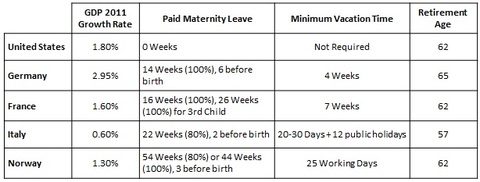The Cost of Leisure Part 2
As we discussed earlier this month, a recession seems almost inevitable and the impact on US GDP growth is negligible. In fact, this morning the Organization for Economic Cooperation and Development warned that Europe risks a severe recession if they can’t halt the sell-off in the Eurozone sovereign debt market. What we did not discuss last week was a potential full blown collapse of the Euro.
What would happen if the 27 country European Union dissolved over a failure to come to terms with member country debt? After extensive searching, I’ve realized I cannot find a single paper written by the International Monetary Fund (IMF) or the European Union (EU) outlining a contingency plan to dissolve the EU and the Euro. Likely, any plan could be catastrophic if leaked and probably not worth the risk of writing. Perhaps this indicates a failure of the EU is not conceivable by the parties.
Before we can address what would happen if the EU fails we should review what's holding the countries back from agreeing on a solution. In simple terms, Germans don't want to pay for Italian leisure at the expense of their own and each country has their own social programs (some much more generous than others).

Countries with these generous social programs need their economy and GDP to grow fast enough to cover the costs. When their economy doesn’t grow fast enough, they must borrow to keep their promises. Currently, it appears to be seen as political suicide for a Leader of an EU member country to decide to cover the debts of a “lazier” EU member country. So what are some possible solutions?
Eurobonds are still out of the question because it puts the burden of generous social programs onto the stronger economies. Hypothetically speaking, if Eurobonds are issued at 4.5% then any member country that was paying more than 4.5% would benefit and any member country that was paying less than 4.5% would be disadvantaged. Germany doesn’t want to backstop Italian summer vacations.
Reworking the EU treaty to stipulate more fiscal controls would certainly be a good place to start if everyone was going to share pain. However, convincing sovereign nations to give up fiscal control is not an overnight process. Getting the 27 members to agree on specific changes to the EU treaty would take more time than they have.
The International Monetary Fund (IMF) could provide a rescue package or credit line to troubled EU members. This option would keep the EU together and buy additional time to revise the EU Treaty. The catch is who funds the IMF. Approximately 17% of the IMF’s funds come from the United States. Instead of Germany paying for Italian summer vacations it will be you and me.
There is also a possibility it may be too late for any solution. What if it all failed? The truth is the largest economy in the world would spend several years trying to figure out how to re-trench and grow again. The geo-political consequences would be significant and we would all face a really ugly "new normal".
We are working diligently to continue to rebalance away from Europe without giving up opportunities to profit. With markets moving so quickly in both directions it’s a non-stop effort to determine the "best" next moves. While Europe slides into a recession and perhaps a depression we will continue to work hard, just like you. I sure hope Europe enjoys their leisure now, because one day the cost might be too much to bear. That's how conflict really starts.
If you have questions or comments please let us know as we always appreciate your feedback. You can get in touch with us via Twitter, Facebook, or you can Email me directly.